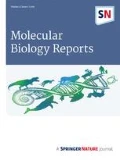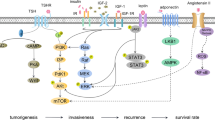Abstract
We aimed to investigate insulin receptor substrate-1 (IRS-1), insulin receptor substrate-2 (IRS-2), insulin-like growth factor binding protein-3 (IGFBP-3) genotypes, which are thought to be involved in the pathogenesis of many solid tumors and have thus far not been studied in patients with differentiated thyroid cancer (DTC). The study consisted of 93 patients diagnosed with DTC (79 females, 14 males) and 111 healthy control subjects (63 females, 48 males). The anthropometric measurements, lipid profiles, thyroid function tests and homeostatic model assessment (HOMA) as an indicator of insulin resistance (IR) of all patients were recorded. In addition IRS-1, IRS-2 and IGFBP-3 gene polymorphisms were determined by using polymerase chain reaction and restriction fragment length polymorphism. Hardy–Weinberg equilibrium was tested for each gene polymorphisms, and genetic effects were evaluated by the Chi Square test and multiple logistic regression. Homeostasis model assessment of insulin resistance (HOMA-IR), body mass index, waist circumference and serum total cholesterol levels were significantly higher in patients with DTC than in the control group. There was no difference between the two groups with respect to IRS-1, IRS-2 and IGFBP-3 gene polymorphisms. In addition, these gene polymorphisms were found to have no effect on lymph node metastases or tumor staging. While, obesity and increased HOMA-IR may be risk factors in DTC development, we suggest that IRS-1, IRS-2 and IGFBP-3 gene polymorphisms do not play an important role in pathogenesis of DTC.
Similar content being viewed by others
References
Enwold L, Zhu K, Ron E, Marrogi AJ, Stojadinovic A, Peoples GE et al (2009) Rising thyroid cancer incidence in the United States by demographic and tumor characteristics, 1980–2005. Cancer Epidemiol Biomarkers Prev 18:784
Tucker MA, Jones PH, Boice JD, Robison LL, Stone BJ, Stovall M et al (1991) Therapeutic radiation at a young age is linked to secondary thyroid cancer. The late effects study group. Cancer Res 51(11):2885–2888
Ron E, Lubin JH, Shore RE, Mabuchi K, Modan B, Pottern LM et al (1995) Thyroid cancer after exposure to external radiation: a pooled analysis of seven studies. Radiat Res 141(3):259–277
Bosetti C, Kolonel L, Negri E, Ron E, Franceschi S, Maso LD et al (2001) A pooled analysis of case-control studies of thyroid cancer. VI. Fish and shellfish consumption. Cancer Causes Control 12(4):375–382
Galanti MR, Ekbom A, Grimelius L, Yuen J (1997) Parental cancer and risk of papillary and follicular thyroid carcinoma. Br J Cancer 75(3):451–456
Soliman PT, Wu D, Tortolero-Luna G, Schmeler KM, Slomovitz BM, Bray MS et al (2006) Association between adiponectin, insulin resistance, and endometrial cancer. Cancer 106(11):2376–2381
Antoniadis AG, Petridou ET, Antonopoulos CN, Dessypris N, Panagopoulou P, Chamberland JP et al (2011) Insulin resistance in relation to melanoma risk. Melanoma Res 21(6):541–546
Siddique A, Kowdley KV (2011) Insulin resistance and other metabolic risk factors in the pathogenesis of hepatocellular carcinoma. Clin Liver Dis 15(2):281–296
Djiogue S, Nwabo Kamdje AH, Vecchio L, Kipanyula MJ, Farahna M, Aldebasi Y, Seke Etet PF (2013) Insulin resistance and cancer: the role of insulin and IGFs. Endocr Relat Cancer 20(1):R1–R17
Rapp K, Schroeder J, Klenk J, Ulmer H, Concin H, Diem G et al (2006) Fasting blood glucose and cancer risk in a cohort of more than 140,000 adults in Austria. Diabetologia 49(5):945–952
Fair AM, Dai Q, Shu XO, Matthews CE, Yu H, Jin F, Gao YT, Zheng W (2007) Energy balance, insulin resistance biomarkers, and breast cancer risk. Cancer Detect and Prev 31(3):214–219
Vigneri P, Frasca F, Sciacca L, Pandini G, Vigneri R (2009) Diabetes and cancer. Endocr Relat Cancer 16(4):1103–1123
Sara VR, Hall K (1990) Insulin-like growth factors and their binding proteins. Physiol Rev 70(3):591–614
Jenkins PJ, Fairclough PD, Richards T, Lowe DG, Monson J, Grossman A et al (1997) Acromegaly, colonic polyps and carcinoma. Clin Endocrinol 47(1):17–22
Harman SM, Metter EJ, Blackman MR, Landis PK, Carter HB (2000) Serum levels of insulin-like growth factor I (IGF-I), IGF-II, IGF-binding protein–3, and prostatespecific antigen as predictors of clinical prostate cancer. J Clin Endocrinol Metab 85(11):4258–4265
Yu H, Spitz MR, Mistry J, Gu J, Hong WK, Wu X (1999) Plasma levels of insulin-like growth factor-I and lung cancer risk: a case-control analysis. J Nat Cancer Inst 91(2):151–156
Malaguarnera R, Morcavallo A, Belfiore A (2012) The insulin and IGF-I pathway in endocrine glands carcinogenesis. J Oncol 2012:635614. doi:10.1155/2012/635614
Zhao ZG, Guo XG, Ba CX et al (2012) Overweight, obesity and thyroid cancer risk: a meta-analysis of cohort studies. J Int Med Res 40:2041–2050
Kitahara CM, Platz EA, Freeman LE et al (2011) Obesity and thyroid cancer risk among U.S. men and women: a pooled analysis of five prospective studies. Cancer Epidemiol Biomarkers Prev 20:464–472
Rinaldi S, Lise M, Clavel-Chapelon F et al (2012) Body size and risk of differentiated thyroid carcinomas: findings from the EPIC study. Int J Cancer 131:E1004–E1014
Chan BT, Lee AV (2008) Insulin receptor substrates (IRSs) and breast tumorigenesis. J Mammary Gland Biol Neoplasia 13(4):415–422
Ouederni TB, Fadiel A, Stambouli N, Scalize TJ, Ben-Maiz H, Abid HK et al (2009) Influence of socioeconomic lifestyle factors and genetic polymorphism on type 2 diabetes occurrences among Tunisian Arab and Berber groups of Djerba Island. Pharmgenomics Pers Med 2:49–57
Ouederni TB, Sanches-Corona J, Flores-Martinez SE, Ben-Maiz H, Skhiri HA, Abid HK, Benammar-Elgaaied A (2009) The G1057D polymorphism of IRS-2 gene is not associated with type 2 diabetes and obese patients among ethnic groups in Tunisian population. Clin Biochem 42:1169–1173
Han SG, Park KH, Sung JS, Whang YM, Kim YJ, Shin ES et al (2008) Single nucleotide polymorphisms of IGFBP-3 gene and lung cancer risk in a Korean population. Lung Cancer 62:152–161
Hursting SD (2012) Minireview: the year in obesity and cancer. Mol Endocrinol 26(12):1961–1966
Vucenik I, Stains JP (2012) Obesity and cancer risk: evidence, mechanisms, and recommendations. Ann N Y Acad Sci 1271:37–43
Pazaitou-Panayiotou K, Polyzos SA, Mantzoros CS (2013) Obesity and thyroid cancer: epidemiologic associations and underlying mechanisms. Obes Rev. doi:10.1111/obr.12070
Kitahara CM, Platz EA, Park Y, Hollenbeck AR, Schatzkin A, Berrington de González A (2012) Body fat distribution, weight change during adulthood, and thyroid cancer risk in the NIH-AARP diet and health study. Int J Cancer 130(6):1411–1419
Peterson E, De P, Nuttall R (2012) BMI, diet and female reproductive factors as risks for thyroid cancer: a systematic review. Plasone 7(1):1–10
Leitzmann MF, Brenner A, Moore SC, Koebnick C, Park Y, Hollenbeck A et al (2010) Prospective study of body mass index, physical activity and thyroid cancer. Int J Cancer 126(12):2947–2956
Clero E, Leux C, Brindel P, Truong T, Anger A, Teinturier C et al (2010) Pooled analysis of two case–control studies in New Caledonia and French Polynesia of body mass index and differentiated thyroid cancer: the importance of body surface area. Thyroid 20(11):1285–1293
Ayturk S, Gursoy A, Kut A, Anil C, Nar A, Tutuncu NB (2009) Metabolic syndrome and its components are associated with increased thyroid volume and nodule prevalence in a mild-to moderate iodine-deficient area. Eur J Endocrinol 161:599–605
Rezzonico JN, Rezzonico M, Pusiol E, Pitoia F, Niepomniszcze H (2009) Increased prevalence of insulin resistance in patients with differentiated thyroid carcinoma. Metab Syndr Relat Disord 7(4):375–380
Sahin M, Uçan B, Giniş Z, Topaloğlu O, Güngüneş A, Bozkurt NC et al (2013) Vitamin D3 levels and insulin resistance in papillary thyroid cancer patients. Med Oncol 30(2):589
Balkan F, Onal ED, Usluogullari A, Tuzun D, Ozdemir D, Inancli SS, Ersoy R, Cakir B (2013) Is there any association between insulin resistance and thyroid cancer? A case control study. 45(1):55–60
Hua SF, Xue FX, Zhang LZ, Wang YM, Zhao J (2008) Expression and activation of insulin receptor substrate-1 in endometrial carcinoma. Zhonghua Fu Chan Ke Za Zhi 43(6):437–441
Nowakowska-Zajdel E, Mazurek U, Ziolko E, Niedworok E, Fatyga E, Kokot T et al (2011) Analysis of expression profile of gene encoding proteins of signal cascades activated by insulin-like growth factors in colorectal cancer. Int J Immunopathol Pharmacol 24(3):781–787
Neuhausen SL, Brummel S, Ding YC, Singer CF, Pfeiler G, Lynch HT (2009) Genetic variation in insulin-like growth factor signaling genes and breast cancer risk among BRCA1 and BRCA2 carriers. Breast Cancer Res 11(5):1–12
Hoang CD, Zhang X, Scott PD, Guillaume TJ, Maddaus MA, Yee D et al (2004) Selective activation of ınsulin receptor substrate-1 and ınsulin receptor substrate-2 in pleural mesothelioma cells: association with distinct malignant phenotypes. Cancer Res 64(20):7479–7485
Cayan F, Tok E, Aras-Ateş N, Ayaz L, Akbay E, Gen R et al (2010) Insulin receptor substrate-2 gene polymorphism: is it associated with endometrial cancer. Gynecol Endocrinol 26(5):378–382
Neuhausen SL, Slattery ML, Garner CP, Ding YC, Hoffman M, Brothman AR (2005) Prostate cancer risk and IRS-1, IRS-2, IGF-1, and INS polymorphisms: strong association of IRS-1 G972R variant and cancer risk. Prostate 64(2):168–174
Renehan AG, Zwahlen M, Minder C, O’Dwyer ST, Shalet SM, Egger M (2004) Insulin-like growth factor (IGF)-I, IGF binding protein-3, and cancer risk: systematic review and meta-regression analysis. Lancet 363(9418):1346–1353
Chen W, Wang S, Tian T et al (2009) Phenotypes and genotypes of insulin-like growth factor 1, IGF binding protein-3 and cancer risk: evidence from 96 studies. Eur J Hum Genet 17(12):1668–1675
McGrath M, Lee IM, Buring J, De Vivo I (2011) Common genetic variation within IGF-1, IGFI-2, IGFBP-1, and IGFBP-3 and endometrial cancer risk. Gynecol Oncol 120(2):174–178
Santosh V, Arivazhagan A, Sreekanthreddy P, Srinivasan H, Thota B, Srividya MR et al (2010) Grade-specific expression of insulin-like growth factor-binding proteins-2, -3, and -5 in astrocytomas: IGFBP-3 emerges as a strong predictor of survival in patients with newly diagnosed glioblastoma. Cancer Epidemiol Biomarkers Prev 19(6):1399–1408
Gigek CO, Leal MF, Lisboa LC, Silva PN, Chen ES, Lima EM et al (2010) Insulin-like growth factor binding protein-3 gene methylation and protein expression in gastric adenocarcinoma. Growth Horm IGF Res 20(3):234–238
Ressler S, Radhi J, Aigner T, Loo C, Zwerschke W, Sergi C (2009) Insulin-like growth factor-binding protein-3 in osteosarcomas and normal bone tissues. Anticancer Res 29(7):2579–2587
Zhao L, He LR, Zhang R, Cai MY, Liao YJ, Qian D et al (2012) Low expression of IGFBP-3 predicts poor prognosis in patients with esophageal squamous cell carcinoma. Med Oncol 29:2669–2676
Safarinejad MR, Shafiei N, Safarinejad S (2011) Relationship of insulin-like growth factor (IGF) binding protein-3 (IGFBP-3) gene polymorphism with the susceptibility to development of prostate cancer and influence on serum levels of IGF-I and IGFBP-3. Growth Horm IGF Res 21(3):146–154
Xu L, Mugartegui L, Li G, Sarlis NJ, Wei Q, Zafereo ME, Sturgis EM (2012) Functional polymorphisms in the insulin-like binding protein-3gene may modulate susceptibility to differentiated thyroid carcinoma in Caucasian Americans. Mol Carcinog 51(Suppl 1):E158–E167
Acknowledgments
The study was supported by the Research Fund of the Trakya University Scientific Research Project (TUBAP-2011/35).
Conflict of interest
The authors declare no conflicts of interest that could be perceived as prejudicing the impartiality of the research reported.
Funding
This research did not receive any specific grants from any funding agencies in the public, commercial, or not-for-profit sector.
Author information
Authors and Affiliations
Corresponding author
Appendix
Appendix
The study was supported by the Research Fund of the Trakya University Scientific Research Project (TUBAP-2011/35).
Rights and permissions
About this article
Cite this article
Akker, M., Güldiken, S., Sipahi, T. et al. Investigation of insulin resistance gene polymorphisms in patients with differentiated thyroid cancer. Mol Biol Rep 41, 3541–3547 (2014). https://doi.org/10.1007/s11033-014-3218-2
Received:
Accepted:
Published:
Issue Date:
DOI: https://doi.org/10.1007/s11033-014-3218-2



